Calls for president to resign as opposition, public voice anger over declaration of martial law

Republic of Korea President Yoon Suk-yeol is facing impeachment over his Dec 3 declaration of martial law, an order he was forced to withdraw within six hours of its announcement as ROK lawmakers unanimously voted against it.
Early on Dec 5, opposition parties officially submitted an impeachment motion against President Yoon Suk-yeol to parliament over his declaration of emergency martial law, local TV footage showed.
The main liberal opposition Democratic Party and five other minor parties, which raised the motion on Dec 4, planned to put it up for a vote on Dec 7.
By law, the 300-member unicameral National Assembly must cast a secret vote on the impeachment motion within 72 hours after it is proposed.
Under the constitution, the impeachment motion must be initiated by a majority of lawmakers and approved by at least two-thirds of the National Assembly legislators.
The opposition will need eight votes from the 108 lawmakers of the ruling People Power Party to get the motion passed.
If it is passed, the constitutional court will deliberate it for up to 180 days, during which Yoon’s constitutional powers will be suspended, and Prime Minister Han Duck-soo will be acting president.
If the court upholds the impeachment against Yoon, a new presidential election would be held within 60 days.
People Power Party lawmakers agreed early on Dec 5 to oppose Yoon’s impeachment, adopting the objection as its basic position.
The ruling party legislators refused to join the parliamentary plenary session on Dec 5, in which the impeachment motion against Yoon was being submitted.
In a televised address on Dec 3, Yoon shocked the nation and the world by declaring “emergency martial law” to contain “anti-state forces” and protect constitutional freedom.
This was the first time martial law had been invoked in the country in more than 40 years.
The announcement drew heavily armed troops to encircle the ROK parliament, while lawmakers scrambled to reenter the building.
People gathered in front of the National Assembly and at Gwanghwamun Square in the heart of Seoul, demanding Yoon’s resignation, impeachment, and arrest.
The standoff played out over a few tense hours, with cameras capturing moments of anger, bravery, and defiance before Yoon was forced to back down.
Woo Su-keun, head of the Institute of East Asian Studies of Korea in Seoul, said that as only eight votes were needed from the ruling People Power Party, of which Yoon is a member, there was a possibility that the impeachment bill would pass.
In a statement, People Power Party chief Han Dong-hoon said that Yoon’s declaration of martial law was “wrong” and urged all Cabinet ministers to resign.
Yoon’s senior aides, including his chief of staff, offered to resign en masse after the National Assembly blocked the martial law decree.
ROK Defense Minister Kim Yong-hyun offered to resign on Dec 4, apologizing for the turmoil.
Hoo Chiew-ping, co-founder and senior fellow of the East Asian International Relations Caucus in Malaysia, said that Yoon frequently used the euphemism “anti-state forces” to describe opposition parties and their members in his remarks at Cabinet meetings.
Hoo said that “using such Cold War rhetoric to target a modern, democratic opposition is not only illogical but also profoundly inappropriate”.
The Korean Confederation of Trade Unions, the ROK’s largest labor union, launched an indefinite nationwide strike from Dec 4, urging its members not to go to work until Yoon resigns.
Ryu Yong-wook, assistant professor at the Lee Kuan Yew School of Public Policy at the National University of Singapore, said, “If the president resigns, a presidential election must be held within 60 days, according to law.”
However, if the impeachment motion is passed, Yoon can challenge its legality in the Constitutional Court, which could take months to reach a decision, Ryu added.
Xinhua contributed to this story.


